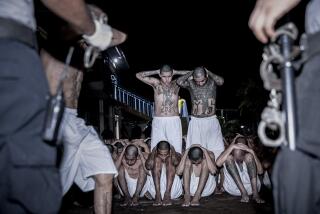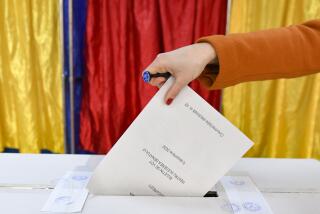U.S. Rights Report Hails Latin America Gains
- Share via
WASHINGTON — The State Department, in its annual report on worldwide human rights practices, on Wednesday hailed a continued move toward democracy in Latin America as the most significant trend in 1984.
The report, detailing conditions in 164 countries, showed no dramatic reversals from last year, although it said that the majority of the world’s population continues to live under repressive regimes and that torture and political killings remain common.
Elliott Abrams, assistant secretary of state for human rights, cited Brazil and Uruguay--both of which elected civilian presidents to replace military dictators--as the leading success stories of the year. He also hailed elections in Grenada and Guatemala but said there have been setbacks in Chile, where President Augusto Pinochet has declared a state of siege.
9 Nations Improve
“Worldwide, I would say the overall significant trend is improvement in the Western Hemisphere,” Abrams said. In the last five years, he said, nine countries in the region have gone from dictatorship to democracy while none has gone the other way.
“No countries have gone through what we would consider a major change (for the worse),” he said. “The greatest disappointment would be Chile. It appears that the recent trend toward political liberalization has stalled.”
There were few surprises in the 1,453-page report, most of which was based on information previously available to the public.
Abrams said that the report, issued each year since 1977, has become the world’s most comprehensive rundown on rights abuses. He said foreign governments have come to expect it and no longer react as angrily as they once did.
Abrams said the department made no effort to rank nations or to compare one country to another. The report was critical of such U.S.-backed regimes as the Philippines and South Korea, although it reserved its harshest condemnation for the Soviet Union and its allies.
“Soviet performance in the realm of human rights fails to meet accepted international standards,” the State Department charged. “The regime’s common response to efforts to exercise freedom of expression is to incarcerate those concerned in prison, labor camp or psychiatric hospital.”
The report related accusations of beatings and other forms of ill treatment of political prisoners in South Korea. “The use of excessive force by the police, despite high-level efforts to reduce or eliminate it, has proven to be a pervasive and ingrained problem,” it said.
Progress in Elections
Still, progress has been made, Abrams said. He cited Tuesday’s National Assembly elections, in which a new opposition party made strong gains although it fell short of the vote for the party of President Chun Doo Hwan.
“The import of this election is infinitely greater than the scuffle at the airport (on the return from exile last week of opposition leader Kim Dae Jung),” Abrams said.
The report added that the situation in Communist North Korea is far worse, with a thorough “regimentation and militarization of society” and ruthless efforts to suppress all opposition.
El Salvador Evaluated
The human rights situation is improving in El Salvador, the report said, although “many violent deaths go unexplained. It is often impossible to distinguish those that are politically motivated (by either side of political extremists) from those which are disguised as such . . . to evade criminal detection. Nonetheless, a substantial number of unexplained deaths . . . can be presumed to be politically motivated.”
The report was more critical of the situation in Nicaragua, where it described political killings and torture of prisoners by the leftist government. The report also repeated Sandinista government charges that U.S.-backed guerrillas, or contras, killed about 1,000 civilians last year.
More to Read
Sign up for Essential California
The most important California stories and recommendations in your inbox every morning.
You may occasionally receive promotional content from the Los Angeles Times.













